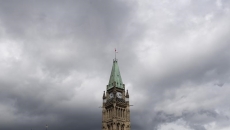OTTAWA - Vaccinated travellers will no longer need to show a COVID-19 test to enter Canada beginning April 1, Health Minister Jean-Yves Duclos officially announced Thursday.
The change is being made at the tail end of the Omicron wave in Canada, as new reported cases of COVID-19 have declined since mid-January.
Duclos said the change is possible because of Canada's high vaccination rates and fewer cases of the virus being detected at the border.
"Over the last few weeks we've seen a significant decrease in the rate of positivity of travellers entering into Canada," Duclos said at a briefing Thursday.
We have always said that as the COVID-19 situation changes, so will our response. That is why we announced today the gradual easing of travel measures & the removal of pre-entry COVID-19 testing for fully vaccinated travelers coming to 🇨🇦 as of April 1st.https://t.co/RKsUYpgEqX pic.twitter.com/49VGzft5oW
— Jean-Yves Duclos (@jyduclos) March 17, 2022
While the positivity rate at airports was about 10 per cent in January, it has since fallen to about one per cent, Duclos said.
Incoming tourists will still need to be vaccinated to visit Canada, and all inbound travellers must also upload their details to the ArriveCan app.
Duclos says vaccinated people could also still be subject to random molecular tests when they arrive at Canadian airports.
Unvaccinated Canadians and other travellers who are exempt from the vaccine mandate will still need to provide a negative rapid antigen or molecular test, or an accepted form of proof of recent infection to enter the country.
Unvaccinated travellers will also be tested on arrival, again eight days later, and will be required to quarantine for 14 days.
The World Health Organization says the number of cases internationally has begun to creep up in the Western Pacific region, Africa and Europe.
Several regions have blamed the rising cases on the prevalence of the more contagious BA.2 variant, a sub-mutation of the Omicron variant which has been given the moniker "stealth Omicron."
BA.2 makes up about 22 per cent of known cases in Canada as of Feb. 20.
Despite the concerning signs abroad, Duclos said he believes Canada's high rate of fully vaccinated people, at 80.85 per cent, will protect the country from serious outcomes.
"I think that we will do very well in the next weeks and months," Duclos said in French at the briefing.
COVID-19 measures at the border are still evolving, he said, and will be adjusted if necessary. Duclos did not say what kind of circumstances might trigger the need for more stringent testing again.
The change has already been met with celebration from Canadian tourist groups like the Canadian Travel and Tourism Roundtable.
"Canada's tourism sector is ready to ensure the safety of travellers, employers and the communities in which they operate. They are ready to welcome back the world," said Tourism Minister Randy Boissonnault of the policy change.
The change will not apply to cruise ships, Transport Minister Omar Alghabra said.
More good news for travellers: starting April 1st, Canada will no longer require fully vaccinated travellers to provide a COVID-19 test to enter the country! pic.twitter.com/iDJWfPwli3
— Omar Alghabra (@OmarAlghabra) March 17, 2022
Rather, passengers will need to take a test no more than one day before they board, but they will not need to take a test in order to get off the ship.






